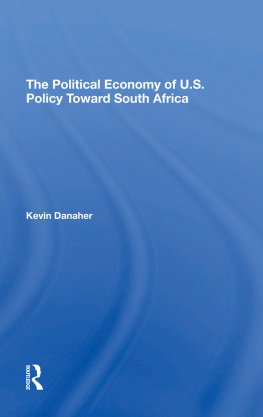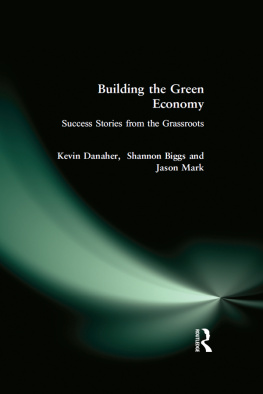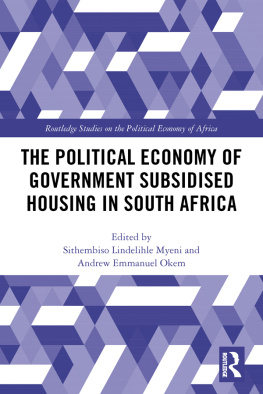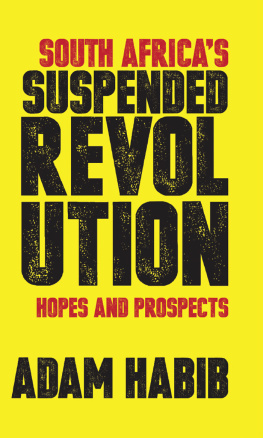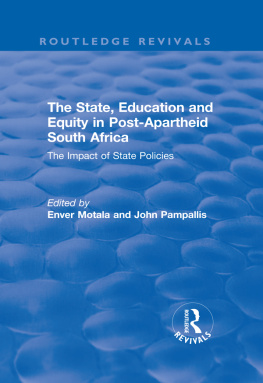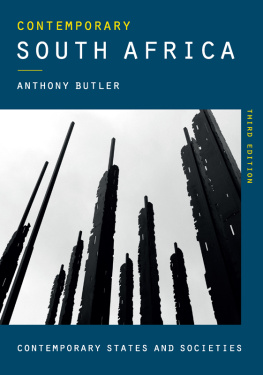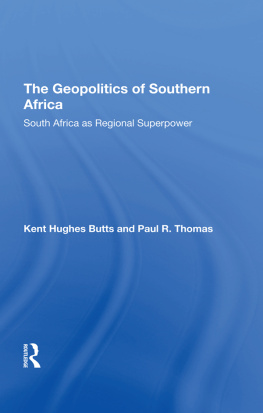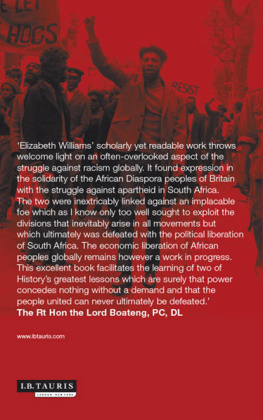The Political Economy of U.S. Policy Toward South Africa
Westview Special Studies
The concept of Westview Special Studies is a response to the continuing crisis in academic and informational publishing. Library budgets for books have been severely curtailed. Ever larger portions of general library budgets are being diverted from the purchase of books and used for data banks, computers, micromedia, and other methods of information retrieval. Interlibrary loan structures further reduce the edition sizes required to satisfy the needs of the scholarly community. Economic pressures on university presses and the few private scholarly publishing companies have greatly limited the capacity of the industry to properly serve the academic and research communities. As a result, many manuscripts dealing with important subjects, often representing the highest level of scholarship, are no longer economically viable publishing projects--or, if accepted for publication, are typically subject to lead times ranging from one to three years.
Westview Special Studies are our practical solution to the problem. As always, the selection criteria include the importance of the subject, the work's contribution to scholarship, and its insight, originality of thought, and excellence of exposition. We accept manuscripts in cameraready form, typed, set, or word processed according to specifications laid out in our comprehensive manual, which contains straightforward instructions and sample pages. The responsibility for editing and proofreading lies with the author or sponsoring institution, but our editorial staff is always available to answer questions and provide guidance.
The result is a book printed on acid-free paper and bound in sturdy, library-quality soft covers. We manufacture these books ourselves using equipment that does not require a lengthy make-ready process and that allows us to publish first editions of 300 to 1000 copies and to reprint even smaller quantities as needed. Thus, we can produce Special Studies quickly and can keep even very specialized books in print as long as there is a demand for them.
About the Book and Author
By tracing U.S. involvement in South African political and economic development since the late 1800s, this book analyzes U.S. corporate and government motives for maintaining the political status quo in South Africa. In recent decades, according to the author, U.S. policy toward South Africa has grown more contradictory: Endeavoring to protect the United States's reputation on the question of race, government officials denounce apartheid, yet Washington remains the main force blocking an international response to South African policies. As the situation in South Africa continues to polarize, the U.S. is increasingly isolated in its position of verbally condemning yet materially supporting South Africa's white minority regime--a regime confronting the distinct possibility of civil war.
Dr. Kevin Danaher, formerly an associate fellow with the Institute for Policy Studies, is currently employed by the Institute for Food and Development Policy in San Francisco. His publications include South Africa and th e United States: An Annotated Bibliography (1979) and South Africa and the United States: The Progression of a Relationship (1984).
Dedicated to
Nelson Mandela
The Political Economy of U.S. Policy Toward South Africa
Kevin Danaher
First published 1985 by Westview Press
Published 2019 by Routledge
52 Vanderbilt Avenue, New York, NY 10017
2 Park Square, Milton Park, Abingdon, Oxon OX14 4RN
Routledge is an imprint of the Taylor & Francis Group, an informa business
Copyright 1985 by Taylor & Francis
All rights reserved. No part of this book may be reprinted or reproduced or utilised in any form or by any electronic, mechanical, or other means, now known or hereafter invented, including photocopying and recording, or in any information storage or retrieval system, without permission in writing from the publishers.
Notice:
Product or corporate names may be trademarks or registered trademarks, and are used only for identification and explanation without intent to infringe.
Library of Congress Cataloging in Publication Data
Danaher, Kevin.
The political economy of U.S. policy toward South
Africa.
(Westview special studies on Africa)
Includes index.
1. United States--Foreign economic relations--South
Africa. 2. South Africa--Foreign economic relations-
United States. 3. United States--Foreign relations-
South Africa. 4. South Africa--Foreign relations-
United States. 5. Corporation, American--South
Africa. I. Title. II. Title: Political economy of
US policy toward South Africa.
HF1456.5.S6D36 1985 337.73068 85-10682
ISBN 13: 978-0-367-29498-4(hbk)
My pursuit of this research began as a personal response to the Soweto rebellion of 197 6. Thousands of youths willing to confront police bullets, armed with little more than innocent courage, were a political phenomenon that riveted my attention. I and many other Americans were prompted to question the role of U.S. institutions in perpetuating apartheid. If this study makes a contribution to the eradication of that system, the many years of work embodied herein will have been well worth the effort.
Most books are the product of many people's labor. This work is no exception. I deeply appreciate the cooperation of the roughly one hundred scholars, journalists, businessmen, government officials, and activists who submitted to interviews in Washington, New York, London, Geneva, Harare, and Johannesburg. Institutions that proved helpful include the Institute for Policy Studies, the University of California library system, the Library of Congress, the National Archives, Howard University library, the United Nations Centre Against Apartheid, the Dag Hammarskjold Library, the London office of the British Anti-Apartheid Movement, and the World Council of Churches' Programme to Combat Racism. For timely financial assistance I thank the University of California and the International Organization for the Elimination of All Forms of Racial Discrimination.
The following people helped with various stages of the manuscript and have my deepest thanks: Nick Allen, Lynne Barbee, Medea Benjamin, G. William Domhoff, Christian Einfeldt, Steve Goldfield, Walter Goldfrank, Robert Lawrence, Stewart Lawrence, Bernard Magubane, Katherine Mitchell, Prexy Nesbitt, James O'Connor, Elizabeth Schmidt, Byron Schneider, and Bereket Selassie. Any mistakes or omissions are solely the responsibility of the author.
Kevin Danaher
Introduction
Conflict in South Africa continues to grow. Political activism by black youth and workers matures steadily as the state implements new repressive measures. The guerrilla movement increases the size and sophistication of its operations, while the apartheid state carries out an unprecedented military buildup. The question is no longer whether or not a social upheaval will engulf the country; rather, it is a question of when that upheaval will occur and what form it will take.
The 1975-76 victories of guerrilla movements in neighboring Angola and Mozambique helped fuel mass protests by the black population of South Africa. Spearheaded by students and young workers, the sustained, nationwide rebellion raised the level of mass politicization to new heights. Since the 1976 Soweto rebellion, black student, church and worker organizations have intensified their political activity at an unprecedented rate.

